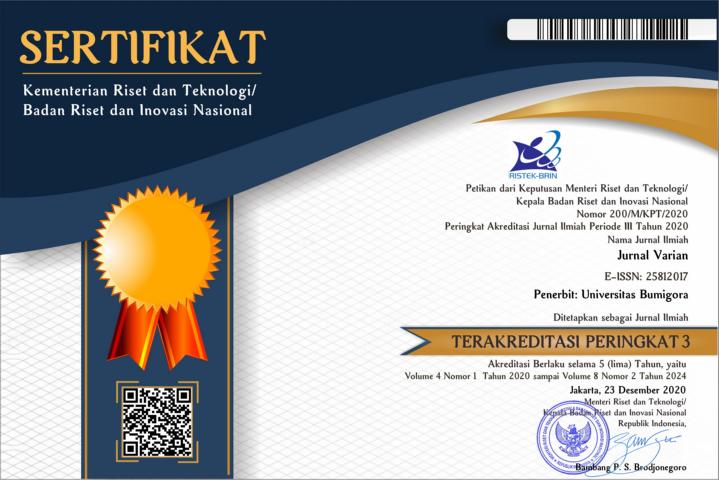Improved Chi Square Automatic Interaction Detection on Students Discontinuation to Secondary School
Abstract
Improved Chi Square Automatic Interaction Detection (CHAID) with bias correction is the development of the CHAID method by relying on Tschuprow's T test calculations with bias correction in the process of forming a classification tree. This study aims to obtain a classification of factors which influence students for not continuing their education from junior high school or equivalent to high school or equivalent. The results obtained in the classification tree produce nine classifications. Based on the results of the classification tree, the classification of students who do not continue their education to high school or equivalent is: students with disabilities who do not have access to Information and Communication Technology (ICTs) (0.89); students who work without disability but do not have access to ICTs (0.73); and students who do not work without disability but do not have access to in ICTs (0.60). Based on the classification obtained the factors which influence students for not continuing their education to high school or equivalent are access to ICTs, employment status, and persons with disabilities. The classification accuracy of the results uses the Improved-CHAID method with bias correction with a proportion of 80% training data and 20% testing data, namely 72.3033% on training data and an increase of 73.3300% on testing data.
References
tree methods. Eurasian Journal of Educational Research, 2019(84):115–134. DOI : https://doi.org/10.14689/ejer.2019.84.6.
Badan Pusat Statistik (2020). Potret Pendidikan Indonesia, Statistik Pendidikan.
Bergsma, W. (2013). A bias-correction for Cramer’s V and Tschuprow’s T. ´ Journal of the Korean Statistical Society, 42(3):323–328.
DOI : https://doi.org/10.1016/j.jkss.2012.10.002.
C¸ etinkaya, Z. and Horasan, F. (2021). Decision Trees in Large Data Sets. Uluslararas Muhendislik Arastirma ve Gelistirme Dergisi,
13(1):140–151. DOI : https://doi.org/10.29137/umagd.763490.
Damayanti, C., Kusnandar, D., and Yudhi (2018). Perbandingan Hasil Pembentukan Pohon Klasifikasi Metode CHAID dan Improved
CHAID. Buletin Ilmiah Mat, Stat, dan Terapannya, 07(4):10–27. DOI : http://dx.doi.org/10.26418/bbimst.v7i4.28655.
Kumar, A. and Kaur, A. (2023). Predicting complaint voicing or exit amidst Indian consumers: a CHAID analysis. Journal of
Advances in Management Research, 20(1):55–78. DOI : https://doi.org/10.1108/JAMR-03-2022-0054.
Lin, C. L. and Fan, C. L. (2019). Evaluation of CART, CHAID, and QUEST algorithms: a case study of construction defects in
Taiwan. Journal of Asian Architecture and Building Engineering, 18(6):539–553. DOI : https://doi.org/10.1080/13467581.2019.
1696203.
Muhajir, M. (2016). Metode Improved CHAID (Chi-Squared Automatic Interaction Detection) pada Analisis Kredit Macet BMT
(Baitul Mal Wa Tamwil). Jurnal Ilmu-Ilmu MIPA, 16(1):55–63. DOI : https://doi.org/10.20885/eksakta.vol16.iss1.art7.
Nugraha, J. (2014). Pengantar Analisis Data Kategorik: Metode dan Aplikasi Menggunakan Program R. Deepublish.
Shahidul, S. M. and Karim, A. H. M. Z. (2015). Factors Contributing to School Dropout Among The Girls: A Review Literature.
European Journal of Research and Reflection in Educational Sciences, 3(2):25–36. DOI : https://doi.org/10.31305/rrijm.2022.v07.
i08.005.Singhal, R. and Rana, R. (2015). Chi-square test and its application in hypothesis testing. Journal of the Practice of Cardiovascular
Sciences, 1(1):69. DOI : https://doi.org/10.31305/rrijm.2022.v07.i08.005.
Sulviana, V., Wigena, A. H., and Indahwati (2018). Implementasi Metode CHAID (Chi-Squared Automatic Interaction Detection)
pada Segmentasi Trend Penjualan Minuman Ringan di Indonesia. Xplore, 2(2):24–31. DOI : https://doi.org/10.29244/xplore.v2i2.
91.
Temu, C. C., Tolok, M. S., Azmi, P. V., and Marsisno, W. (2019). Faktor-faktor yang Memengaruhi Putus Sekolah Usia SMA di
Provinsi NTT Tahun 2016. Seminar Nasional Official Statistics, 2019(1):583–592. DOI : ttps://doi.org/10.34123/semnasoffstat.
v2019i1.158.
Yang, Y., Yi, F., Deng, C., and Sun, G. (2023). Performance Analysis of the CHAID Algorithm for Accuracy. Mathematics, 11(11).
DOI : https://doi.org/10.3390/math11112558.

This work is licensed under a Creative Commons Attribution 4.0 International License.


















